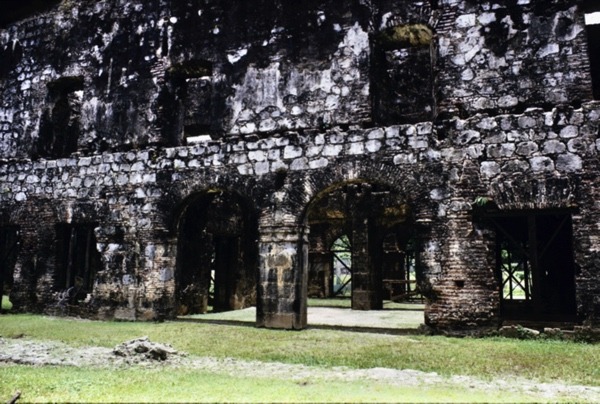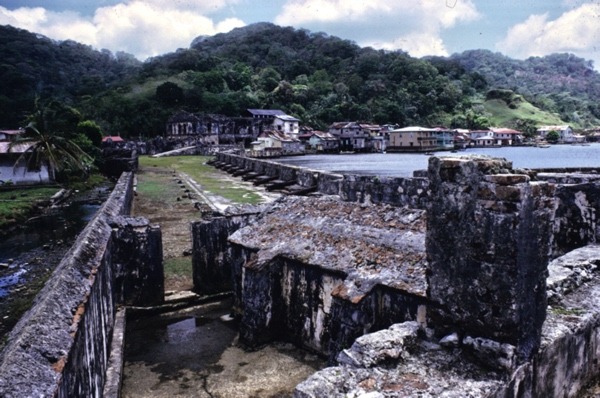From My Notebook 48 Years Ago: Leaving Panama
28th May 2023 |
I spent a lot of my early life very close to Portobello Road, in North Kensington, so I felt a particular attachment to the Spanish port of that name.
This is where Spain counted and loaded its treasure fleets.

An obvious target for pirates and privateers, it was well defended. You can see the canon still lined up below, facing the Caribbean.

April 29th, Monday
I leave for Costa Rica. Very soon one cylinder starts missing. If it gets worse, it seems I may have to turn back. It’s hard to reject the idea. But the missing continues, uncertainly – worst when engine is asked to work harder. Fiddling with the HT lead seems to affect it. Plugs are white. I raise carb needle. That night I get close to border. David (a town) then Concepcion. Decide to go to Volcan. It’s wet but not raining. Volcan is nearly at 3000 metres. All lush but nowhere obvious for tent. At entrance to town are cabañas, $8 a night. Ask a young man where I can go. Eventually he suggests I can sleep in the garage, and tells me where to eat. Have fish, and converse with several Panamanians who are very friendly and interested in my journey. The garage is a porch with pillars. Good for a hammock. The man comes over to talk with me. He’s an evangelist and wants to do me good.
“What a remarkable coincidence,” he says, “that we should meet. If you had arrived a few minutes earlier or later, we would have missed each other.”
He is straining my sense of the miraculous, but he means well. His tracts are in Spanish, distributed free from some US mission.
“Sospendido por un hilo,” is one of them. “Pessada y hallado falta,” is another. [Hanging by a thread. Weighed and found wanting]. Like US advertising slogans, they are translated literally, word for word. Coca-cola – “Chispa de la vida.” [Spark of life] McDonalds – “Su classe de lugar. » [Your kind of place]. They say the translations really don’t work at all. I think this is a very good example of what is really offensive about North American intrusion into South America. Before sleeping I changed a coil on the bike to try and track down the fault. Put foam plastic in hammock against cold.
April 30th
Morning was lovely. Small dog was dashing about the garden, occasionally dashing towards me and then, overcome by nervousness, dashing off again. Standpipe in garden produced milky water. Rode off to highway, then to Routier at Paso Canoas (The frontier).
Not too difficult. About fifteen minutes each side. Then to first town for breakfast – quite a nice place – eggs, rice and meat – two coffees. Rode on and passed a petrol pump. [My principal vice, for I knew I should stop but wanted to change money first, which I should have done at the breakfast town but I was too impatient] and shortly afterwards ran dry.
The bike was burning too much gas and the cylinder was still missing. I got a litre of petrol off a laughing woman and gave her fifty cents for it. It didn’t last me. I stopped some telephone people, and they siphoned half a gallon for me.
The mountain range before San José took me by surprise. I hadn’t expected anything so ambitious – both high and long – very cold air and a lot of cloud/fog. Meanwhile I had changed back to the French plugs and the misfiring ceased. However, the provisional rocker-box plug was failing and I was losing oil over the engine, carb, and gearbox. Also overheating and possibly the two were connected.
Got into San Pedro at 4.30 and it began to rain. Stopped for coffee and watched two girls drinking tea and doing their nails by the window. One was very pretty and they both smiled at me a lot. Should have done something about it, but I didn’t imagine that I would be sleeping next door for two days.
When I came out, found Lee waiting by the bike. He was from Boston, had come down with two others – Richard and Gerry – on two Harley Sportsters and a truck.
[He saw that I’d come halfway round the world]
He invited me to stay. I thought I should try to get to Mark and Sally Beaudoin [friends of friends] but asked if I could come back if necessary.
“Sure,” he said. “See you tonight or tomorrow morning.”
I went on into town and saw the rain clouds ahead. Then o the turnpike it began to pour. The directions were confusing, and I rode around in buckets of rain before finding the address. They had moved out a week earlier. Now I was very thankful to know that Lee was there. He received me enthusiastically in the restaurant – called La Fanega – which they had bought only two weeks before from another American.
Half-pound hamburgers, quesoburgesas, pescoburgesas, machoburgesas, cerveça cruda (draught), dim light, good music, lots of writing on the wall.
[I stayed a few days, sleeping in a storeroom, and then moved on to another friend of a friend on the Gringo expat circuit, the Davidsons at their Santa Ana ranch. He was away but his wife, Pat Davidson, young and lonely, invited me with enthusiasm.]
The Country Club. Christina the impeccable gossip from Florida, with the perfect sweet American “ass” and the slightly buck-toothed cocktail sipper’s mouth, dispensing chat about the Foxes, the world’s most disagreeable couple – ugly as sin – he an alcoholic about to die – she a telephone addict. Forbidden the phone she uses the neighbour’s and runs up 6000 colones – $750 – in a month. A cosmetic surgery freak – her eyes lifted and two inches of stomach fat – eager to show her scars she drops her pants without provocation – “Isn’t she gross!” When he was ill last she hired a Lear jet in Miami to fly down and pick him up that instant. “It burns my stomach,” was one of Christina’s expressions.
